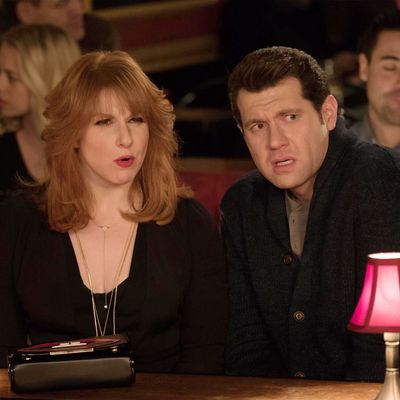
Julie: “Did you know I have a theory that Anne Hathaway was born without a clitoris?”
Billy: “That explains The Intern.”
I’m not sure what sort of shelf life a joke like that will ultimately enjoy, but it made me laugh, because it’s the kind of hyper-specific, pop-culture–driven exchange that only Difficult People’s characters would have, and because it’s unique to their neurotic, petty, us-against-the-world friendship. The bond between Billy (Billy Eichner) and Julie (Julie Klausner) is the backbone of this series, which plants its immaculately shod feet in the path of wannabe-high-art TV and sneers, “Nah.” It even lobs fruit at the kinds of shows I praised in a recent New York piece about the rise of the “Comedy in Theory” — the half-hour series that embrace serialized narrative instead of wrapping things up at the end of an episode, and that are more likely to be unsettling or strange than light and goofy. Julie describes one such (nonexistent) program: Horse, a Netflix critical darling about a single mom who sells smack to support her daughter’s horseback-riding lessons. “When did comedies become 30-minute dramas?” Billy asks, with an aghast tone that suggests Difficult People is not interested in becoming one.
The new installments pick up where the season-one finale left off, which happens to be more or less where season one began: with Billy and Julie on the outside of the fame fishbowl, laughing at how disgusting the water is and chastising themselves for not having been asked to swim in it. “Are any of us really doing what we want, Vitamix?” asks Julie’s kindhearted boyfriend, Arthur (James Urbaniak), a WASP that Julie’s loose-lipped therapist mom, Marilyn (Andrea Martin), has sized up as an alcoholic. Well, no — of course not.
But Julie and Billy keep hatching schemes like a couple of Lucy Ricardos, even though their quest is motivated less by a burning urge to express themselves than a lust for fame and comfort. Julie angles to land a TV-writing gig like other former recappers by insinuating herself into a synagogue populated by industry insiders (including a showrunner played by Sandra Bernhardt, who’s much too special a performer to be playing a character with so little personality). They plot to come up with their own revolting version of the ice-bucket challenge and somehow rope Nathan Lane into participating. The plots and subplots usually converge at the end, in Seinfeld or Curb style, always in a rather arbitrary way, but the transparent machinations are part of the show’s charm; Difficult People is so aware of itself as a TV program that it could have either of its lead characters deliver smart-assed asides to the audience and get away with it.
The first few episodes of season two are pretty, pretty, pretty good, to quote Curb Your Enthusiasm’s Larry David, whose spirit hovers over most of the plots. Some of the celebrity stunt-casting is better in theory than in practice (such as Tina Fey playing herself). And the new characters are hit and miss: Billy’s potential boyfriend, a jelly-bean heir and 19th-century fetishist played by John Mulaney, is sublimely silly (“I think it’s sexy that you dress like someone who can still get the measles,” Billy tells him), but the new coffee-shop employee, a transgender conspiracy theorist (Shakina Nayfack) who shoehorns 9/11 truther slogans into other people’s conversations, is a laundry list of characteristics in search of a character. But the episodes are so briskly paced and the tone so expertly judged that you tend to enjoy it all in the spirit in which it was intended. The show is a jar of bittersweet jelly beans. You can’t eat just one.


